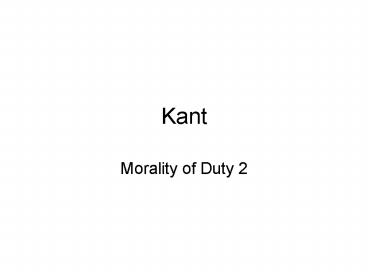Kant - PowerPoint PPT Presentation
1 / 18
Title:
Kant
Description:
'Act as though the maxim of your action were by your will to become a universal ... worth of the command is more obvious in cases where we have no inclination ... – PowerPoint PPT presentation
Number of Views:87
Avg rating:3.0/5.0
Title: Kant
1
Kant
- Morality of Duty 2
2
- We have seen that, for Kant
- Duty is expressed in categorical imperatives
one form of which is - Act as though the maxim of your action were by
your will to become a universal law of nature.
(extract, p.274)
3
- We could call this the principle of
universalisability. - So the question is, can I universalise my
intention to lie to a particular person, in a
particular situation? - If the maxim of my action cannot be
universalised, then it goes against Duty.
4
- Two Problems
- 1. Kant acknowledges that he doesnt know if such
imperatives really exist he will try to prove
it (although he finally admits to failure).
5
- 2. Critics argue that there are many practical
and moral problems with such a rigid
interpretation of duty never lie under any
circumstances, etc.
6
- 1. What Kant wants is to prove that there is a
practical law which of itself commands absolutely
and without any incentives, and that obedience to
this law is duty (p.276). - Note absolutely no incentives obedience.
7
- He wants to show that this principle is above all
merely human (empirical) considerations it is
a principle, a law of Reason, which applies to
all rational beings not just humans. - So, the merely human, the merely empirical are
of no concern to it. Note how totally
un-Aristotelian this is.
8
- Kant points out that the intrinsic worth of the
command is more obvious in cases where we have no
inclination to act according to duty in other
words, the more unpleasant the act, the more
moral the person (see p.277).
9
- Here philosophy must show its purity and must
appeal only to the supremacy of the law and due
respect for it. Otherwise, we are condemned to
self-contempt and inner abhorrence (p.277).
10
- Now, if it is necessary for all rational beings
to judge their actions by asking if they could
will them to be universalised, then the
explanation for this must have something to do
with the nature of the will of rational beings. - What is the nature of the will?
11
- It is either relative/material/hypothetical
aiming at some temporary or conditional end/goal - Or, it is objective, aiming at some end of
absolute value. - This is rather like Aristotles idea of happiness
as the ultimate, unconditional goal of life. - BUT
12
- But, for Kant, the only end in itself is the
person the rational being. - Such beings are not merely subjective ends but
are objective ends, ie., beings whose existence
in itself is an endfor, without them, nothing of
absolute worth could be found. (p.279) - The person is necessarily an end for everyone
because it is an end in itself.
13
- And, on the basis of this, Kant gives us a new
formulation of the categorical imperative
although it still hasnt been proven! - Act so that you treat humanity, whether in your
own person or in that of another, always as an
end and never as a means only. (p.279)
14
- Question if we applied this principle to the
lying examples, would we get the same result? - If you lie to your mother about breaking the
vase, are you treating her as a means only and
not as an end? Is the lie an act that
disrespects her nature as a rational being? - Perhaps
15
- Back to our second Problem
- 2. Critics argue that there are many practical
and moral problems with such a rigid
interpretation of duty never lie under any
circumstances, etc.
16
- At the end of the Reading you will find Kants
response to this kind of criticism. - A lie may not harm any particular individual in
some cases it may save a life. BUT a lie harms
mankind generally, for it vitiates the source of
law itself (p.281)
17
- And If you lie to stop a murder, then you become
responsible for all the unforeseen (and
unforeseeable) consequences of this lie. Whereas
if you tell the truth, all responsibility stays
with the (potential) murderer. - Satisfactory answer??
18
- Summary
- Kants ethics is a form of deontology (focuses
on duty). - Our moral duties are based on Reason they are
expressions of the law of reason. - We are categorically obliged to conform to duty
because of our nature as rational beings.























![⚡Read✔[PDF] The Linguistic Condition: Kant's Critique of Judgment and the Poetics of Action PowerPoint PPT Presentation](https://s3.amazonaws.com/images.powershow.com/10046724.th0.jpg?_=202406030512)







